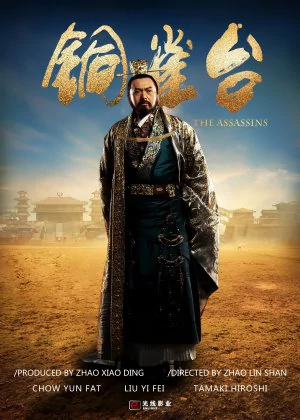The Assassins
Movie details

The historical epic is probably one of China's most beloved movie genres. Each year a bunch of new genre entries are released onto the general public, trying to outsize and outsmart all the ones that came before. Usually these films are helmed by big-name directors (with a lot of money comes a lot of responsibility), but with The Assassins [Tong Que Tai] Linshan Zhao proves that straying from the beaten path can be quite beneficial too.
![screen capture of The Assassins [Tong Que Tai]](/thumbs/style/site/1200xauto/the-assassins-1.webp)
Through the years the genre has evolved quite a bit. Ten years ago these film were infused with high-spirited martial arts and colorful action sequences (most of them led by Yimou Zhang's influence), but over the years the epics became grittier and more focused on strategy and clan relationships instead of stylized dramatics and action sequences. The Assassins follow this trend quite faithfully, another good (and recent) example is Daniel Lee's White Vengeance.
The effect of this shift in focus is quite drastic. Where these type of films used to be ultra-stylized popcorn affairs, the newer ones require more attention from the viewer as the story revolves more around characters and intrigue. Not everyone in the West seems to have caught on to this trend though, often resulting in meager appreciation of the few films that do make it over here. It's a real shame because a film like The Assassins has a lot of things to be happy about.
The story follows the life of Cao Cao, a feared warlord who crowns himself king of his people after defeating his primary adversary. While his actions are relentless, Cao Cao is driven by a motivation to unite the people under his command rather than personal power or status. Even the emperor starts to fear the presence of Cao Cao, which quickly becomes a real threat to Cao Cao's own health. The more powerful he becomes, the more frequent the assassination attempts on his life.
![screen capture of The Assassins [Tong Que Tai]](/thumbs/style/site/1200xauto/the-assassins-2.webp)
Visually The Assassins is nothing less than stunning. While Zhao doesn't completely forsake the use of color, most of the scenes have a dark, griitty and grim veil hanging over them. Color comes in the form of accents, often a dress of drape that stands out in between the blues and grays that make up the rest of the screen. The camera work is solid too, the setting are detailed and lavish and the editing spot on (especially during the action scenes). All in all, Zhao definitely delivers.
The soundtrack is pretty much what you'd expect from a film like this. The main pieces are a combination of traditional Eastern and Western influences, while a selection of more upbeat tracks appear underneath the few action sequences that the film holds. I can't say that the score really sticks, but it never feels out of place or badly integrated either. Historical epics aren't really known for their original scores and The Assassins is clearly no exception.
Part of the film's success can be attributed to the strong and confident role of Chow Yun-Fat as Cao Cao. I've never been much of a fan of Chow but I must admit that he's done some pretty great work the past couple of years (most notably his amazing role in Jiang's (Let The Bullets Fly). He gives his character the fearful aura needed for the job, equal parts wit and brutality. The supporting cast is actually pretty strong too, but they still pale in comparison to Chow's performance.
![screen capture of The Assassins [Tong Que Tai]](/thumbs/style/site/1200xauto/the-assassins-3.webp)
While a typical historical epic in styling and grandeur, the film itself plays more like an Yakuza/Triad film. The focus lies primarily on Cao Cao's character and the moves he makes to get himself closer to the goal of uniting the people of his country. To accomplish this, he plays an intriguing game of chess with the emperor and related tribes, trying to predict and counter their moves without getting killed in the process. Add to that a strong and tragic romance and you'll understand that this film doesn't necessarily speak to the same people who fell in love with Yimou's early 2000 epics.
The Assassins is an accomplished addition to the genre. The film looks beautiful, Chow Yun-Fat is superb and the strategic implications of the story are intriguing. There are only a few action scenes and while adequately directed they are clearly just secondary to the the rest of the film. I really don't get why films like these are getting such harsh critiques, maybe a slight adjustment in expectations (trailer-cutting) would go a long way in advising people what kind of film they're signing up for. If you ask me, Zhao is definitely a talent for the future.